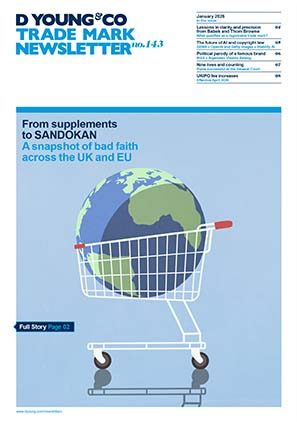Bad faith: Outsource Professional Services v Flatworld Solutions
It isn’t that often cases on the question of bad faith reach the Court of Justice of the European Union (CJEU). As usual the outcome is heavily dependent out the facts specific to the case.
Here, the court confirmed:
- that the concept of bad faith should be considered on its own merits, focussing on the honesty of intent at the time of filing; and,
- simply because a phrase may be descriptive does not prevent its adoption from potentially amounting to bad faith; and
- it is not necessary for a likelihood of confusion on the part of the public to be established in order for Article 52(1)(b) to apply.
Background
In 2007 Outsource2India, a German business, filed a European Union trade mark (EUTM) application for OUTSOURCE 2 INDIA (and device) with the mark subsequently registering in 2008 without any opposition.

In 2013 an Indian company, Flatworld, filed an application for a declaration of invalidity alleging the trademark had been filed in bad faith by Outsource2India.
Article 52(1) (b) of the EUTM Regulation simply says “A trade mark shall be declared invalid … where the applicant was acting in bad faith when he filed the application for the trade mark.”
The Cancellation Division upheld the claim finding Outsource2India had intended to appropriate the element “outsource2india”, which was already in use by Flatworld in the European Union. By filing such an application for registration, Outsource2India had acted in bad faith.
Outsource2India appealed and the Fourth Board of Appeal (BoA) of the EUIPO annulled the decision of the Cancellation Division.
In doing so they raised an interesting question. Could bad faith arise where the term used is descriptive?
The Board of Appeal held that as the phrase “outsource2india” is descriptive it may be freely used by all traders in the sector for outsourcing services to India, and thus bad faith could not occur. They also held that as the mark included figurative elements that Flatworld had never used, this indicated a lack of dishonest intent.
To shore up their decision the Board of Appeal noted the application filed by Flatworld in 2010 for the stylised mark:

Apparently this had been used by Flatworld in the EU prior to 2007 and with Outsource2India’s knowledge.
“Are you sure?” said the General Court (GC) when Flatworld appealed.
The GC held it was necessary to examine Outsource2India’s intention at the time the application was filed. The GC concluded that bad faith had occurred as a result of the “pre-contractual relationship” which existed between the parties in 2007.
The GC added that their assessment was independent of the question whether the wording “outsource2india” is descriptive and this was not relevant to the assessment as to whether bad faith had arisen.
Outsource Professional Services was granted leave to replace Outsource2India and appealed to the CJEU.
Crucially for this case, an appeal to the CJEU lies on points of law only and thus the dispute over the facts regarding the relationship between the parties in 2007, which rumbled on, was dismissed by the court.
The appellant argued that the GC should have dismissed the appeal in the absence of a likelihood of confusion, contending that the marks are figuratively different and their only common element, namely the element “outsource2india”, is descriptive.
The court held (following Koton Mağazacilik Tekstil Sanayi ve Ticaret AŞ v European Union Intellectual Property Office [see note 1 below]) it is not necessary for a likelihood of confusion on the part of the public to be established in order for Article 52(1)(b) to apply.
The court agreed with the GC: Outsource2India had systematically presented its use of Outsource2India as being linked to its proposed collaboration with Flatworld and thus bad faith had occurred.
In considering the potentially descriptive nature of the element “outsource2india” The CJEU said this was not a relevant factor and Outsource2India had acted in bad faith by seeking to exploit that element on the coat-tails of Flatworld.
In short
This case confirms that almost the sole issue is the extent to which there is dishonest intent at the relevant time. By their very nature bad faith cases will turn on the evidence presented to the court.
Notes
- Koton Mağazacilik Tekstil Sanayi ve Ticaret AŞ v European Union Intellectual Property Office (Case C‑104/18 P): see https://dycip.com/c-10418
Case highlights at a glance
Jurisdiction: European Union
Decision level: CJEU
Parties: Outsource Professional Services Ltd (appellant) and Flatworld Solutions
Pvt Ltd (applicant) and the EUIPO (defendant)
Date: 13 November 2019
Citation: C‑528/18
